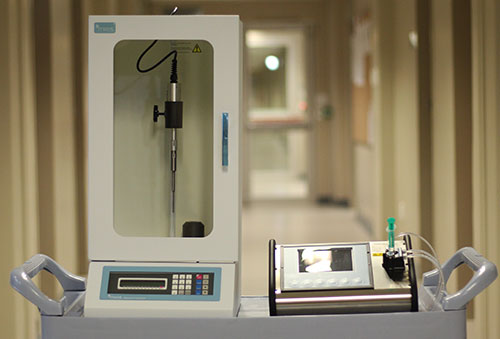Stellenbosch University (SU) recently became the first university in Africa to acquire a MIRIS Human Milk Analyser. This device is used in neonatal units and analyses the nutritional composition of breast milk, which is crucial in the case of premature babies with particular nutritional needs.
Staff at Tygerberg Hospital recently completed special training from the Swedish suppliers, and the milk analyser is now ready to be put to good use.
Dr Evette van Niekerk, Senior Lecturer in the Division of Human Nutrition at SU's Faculty of Medicine and Health Sciences (FMHS), said she was very excited at the university's acquisition of the equipment.
“Until now there were no resources to analyse breastmilk on site at Tygerberg Hospital and samples needed to be stored, transported and analysed at other local and international institutions," said Van Niekerk.
“The MIRIS Human Milk Analyser offers a unique opportunity for direct determination of the nutritional content of breast milk. With the new instrument, the analyses are done without chemicals, and results are obtained within minutes."
Among the features of the instrument are its small size, its robustness and easy handling. “The instrument is portable and is intended for use in hospitals, milk banks and for research purposes," said Van Niekerk.
“We have been doing research on human milk especially on pre-term infant milk and how the quality of the milk affects their growth and development. It is very expensive to have these analyses done if you don't have the facilities and equipment to do the analysis yourself. We have about 110 pre-term infants at a time at Tygerberg, so having the equipment here will be very helpful. It will improve our quality of care in that we can provide adequate nutritional intervention for the babies. Pre-term babies, because of their size, have much higher requirements in terms of nutrition. The breast milk of the mother of a preterm infant is normally of a higher quality, but often it is still not enough for the baby and has to be supplemented with additional nutrients.
“With the MIRIS milk analyser, we can analyse the milk of the mom and see exactly what mom is giving, and supplement accordingly. This means the babies will grow faster, have better neurodevelopmental outcomes and be discharged earlier."
Van Niekerk says she is planning some research studies in the next few months to show the impact of using the analyser.
“Additionally, because we are the first institution in Africa to buy this machine, it means we have the opportunity and also the responsibility to assist our fellow physicians and institutions who have preterm infants in analysing the breast milk for their pre-term infants."
Van Niekerk said she believes people have not yet seen the importance of breast milk content in South Africa. “Our breastfeeding rates are improving but in neonatal care it is important that we fulfil the nutritional needs of these infants with individualised fortification. It is a great step in the right direction, by acquiring this equipment."
Caption: Dr Evette van Niekerk
Photo credit: Wilma Stassen

